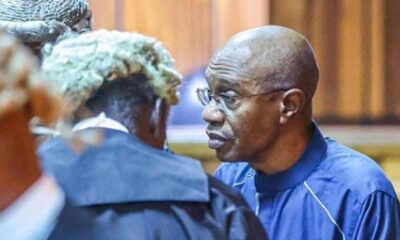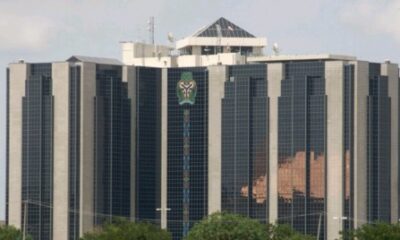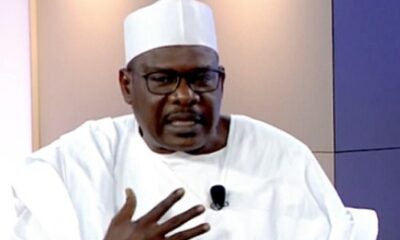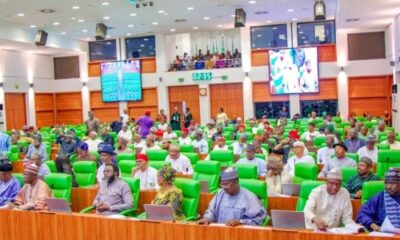The Central Bank of Nigeria (CBN) has directed Deposit Money Banks to remove the rate cap on the naira at the official Investors and Exporters’ Window of the foreign exchange market, to allow for a free float of the national currency against the dollar and other global currencies.
This came barely two weeks after President Bola Tinubu promised to unify the nation’s multiple exchange rates, and less than a week before the suspension and detention of CBN Governor Godwin Emefiele whose unorthodox monetary policies had become a stumbling block to investors and the economy.
The CBN’s decision to float the currency was hailed by the organised private sector and economists who said the move would unify the country’s multiple exchange rate and bring sanitise the FX market
The development means buyers and sellers of foreign currency in the official FX markets are now allowed to quote rates they find comfortable in the FX market, as against the previous practice where rates were dictated by the Central Bank of Nigeria.
Following the development, the naira depreciated to N664.04/dollar at the close of trading at the I&E Window on Wednesday, according to data from the FMDQ Securities Exchange.
That implies a 40.97 percent decline in the naira value compared to the 471/dollar rate which the national currency closed at the I&E Window on Tuesday. Data from the FMDQ Exchange showed that trading at the I&E forex window opened at 473.83/$ before closing at 664.04/$. A total turnover of $193.33m was recorded.
The naira had always closed below N480/dollar at the I&E Window over the years.
However, the CBN had yet to update the I&E Window rate on its website as of 9pm on Wednesday.
The central bank quoted N463.38/$ as the I&E rate for June 9, 2023.
According to the chief executive officer of a commercial bank, who confirmed the development, banks are now allowed to trade forex on the I & E window at any rate, subject to N1 spread.
“The CBN has called banks that the rate cap has been removed at I&E Window. Hence, banks and customers are allowed to trade freely at any rate subject to N1 spread between buy and sell rate”, the bank chief said.
In a statement on Wednesday signed by the CBN’s Director of Financial Markets, Dr Angela Sere-Ejembi, the apex bank confirmed that major changes had been made to the operations of the foreign exchange market.
According to the statement, the CBN has collapsed all foreign exchange segments into the I&E window.
It read, “The Central Bank of Nigeria wishes to inform all authorised dealers and the general public of the following immediate changes to operations in the Nigerian Foreign Exchange Market: Abolishment of segmentation. All segments are now collapsed into the Investors and Exporters window. Applications for medicals, school fees, BTA/PTA, and SMEs would continue to be processed through deposit money banks.
“Re-introduction of the ‘Willing Buyer, Willing Seller’ model at the I&E Window. Operations in this window shall be guided by the extant circular on the establishment of the window, dated 21 April 2017 and referenced FMD/DlR/ClR/GEN/08/007. All eligible transactions are permitted to access foreign exchange at this window.
“The operational rate for all government-related transactions shall be the weighted average rate of the preceding day’s executed transactions at the I&E window, calculated to two decimal places.”
Other changes include, “Proscription of trading limits on oversold FX positions with permission to hedge short positions with OTC futures. Limits on overbought positions shall be zero.
“Re-introduction of order-based two-way quotes, with bid-ask spread of N1. All transactions shall be cleared by a Central Counter Party.
“Reintroduction of Order Book to ensure transparency of orders and seamless execution of trades.”
The CBN also ended the RT200 rebate scheme and the Naira4Dolar remittance scheme.
“Cessation of RT200 Rebate Scheme and the Naira4Dollar Remittance Scheme, with effect from 30 June 2023.
“Further guidance on these matters shall be communicated in due course. All market participants and the general public are kindly enjoined to abide by these rules,” the statement added.
The CBN added that operational hours of trades shall be from 9am to 4pm, Nigeria time.
Meanwhile, at the parallel market on Wednesday, the naira closed at 757/dollar. Currency dealers in Lagos, Abuja and Lagos airport said the naira was sold and bought at 757 and 750, respectively. They said the development at the official market was affecting the black market.
Stocks Gain N992bn
The Nigerian stock market seems to be responding well as it continued its upward trajectory on Wednesday, extending the gains recorded on Tuesday.
Analysts attributed the gain to reports of the naira float by the CBN.
Nigerian banks led top gainers on Wednesday as the Nigerian Exchange continued its recent rebound attributed to critical economic decisions by the Bola Tinubu administration.
In a development that followed Tuesday’s bullish trading day, the All-Share Index traded 3.99 per cent higher to close at 59,985.10 index points, up from the 58,163.55 index points recorded in the previous day’s trading session.
The market capitalisation also appreciated by N992bn, closing at N32.662tn. This represented a 3.13 per cent gain against the N31.670tn recorded in the previous trading session.
International Breweries (10.00 per cent) led the gainers while Pharm Deko (-9.65 per cent) led the losers. UBA Plc was the most traded equity by volume at the end of Wednesday’s session.
Other top gainers included Sterling (10 per cent), Transcohot (10 per cent), Dangote Sugar (10 per cent) and First Bank Nigeria Holdings (10 per cent).
Following Pharmdeko on the losers list were CWG (-9.44 per cent), NNFM (-8.66 percent), BUA Cement (-6.52 percent), and ARDOVA (-5.06 per cent).
The top three traded shares by volume were UBA (230,764,290), GT CO (125,469,900) and Zenith Bank (119,143,503).
Value-wise, the top three traded shares were GTCO (4.2bn), Zenith Bank (N3.9bn) and UBA (N2.7bn).
The Vice Chairman, Highcap Securities Limited, David Adonri, said the floating of the naira by the CBN as a major factor that helped consolidate the momentum from the previous day’s trading period.
He said, “Those of us who are operators in the financial sector, we have been clamouring for floating of the naira so that the true value of the naira can emerge from a market-determined rate. This floatation is quite attuned to our yearnings.”
OPS, Experts React
Reacting to this, a facilitator with the Nigeria Economic Summit Group, Dr Ikenna Nwaosu, kicked against the unification of the exchange rates adding that there should be at least two rates, one for commercial and one for education.
He however admitted that it would bring clarity to the foreign exchange market.
“It brings a lot of clarity to forex as against the multiple forex windows under the former regime. The last regime under the suspended CBN governor had almost 12 forex windows. There was one for oil and gas, one for import and export and there was one for students so there were so many but this unification brings some clarity,” Nwaosu said.
The Fiscal Policy Partner and Africa Tax Leader at PricewaterhouseCoopers, Mr Taiwo Oyedele, said the development might drive the government’s $42bn external debt to N90tn.
He said, “With the Nigerian naira now exchanging in the official forex market at market-determined rates, a significant market distortion has been removed. Expectedly this will come with both positive and negative implications.
“The major impacts will include a significant rise in government debt in naira terms by about N12tn to N90tn i.e. external debt of $42bn will increase by the difference between the old and new rates.”
Oyedele also noted that there might be an increase in debt to Gross Domestic Product ratio by about five per cent, alongside an increase in foreign debt service cost.
He, however, said that this move would likely increase the government’s revenue and reduce the budget deficit.
“Government’s revenue will increase in naira terms resulting in a higher tax/revenue to GDP ratio. Corporate tax collection may however decline as many businesses crystallize forex losses due to the higher exchange rate.
“Possible reduction in budget deficit if government’s forex revenue exceeds foreign currency obligations, an increase in the budget deficit will arise if otherwise,” he said.
Oyedele also said that the development would lead to cost savings and attract foreign exchange inflows, adding that the capital market will benefit from this, among other benefits.
Also speaking, the Deputy-President of the Lagos Chamber of Commerce and Industry, Gabriel Idahosa likened the decision by the CBN to float the naira as a painful but necessary surgery that needed to be conducted on the economy.
According to him, the decision to keep separate windows has caused significant damage to Nigeria’s economy for a long period of time.
He said, “It was a situation whereby we managed to keep something that was bad for a very long time until we had a government that had the willpower to do what needed to be done. We did not have governments that thought things through, they didn’t understand that it simply does not align with the natural order of any economy to have such a wide variation in the price of a homogenous commodity.
“It doesn’t require such a complicated economic analysis to show that we had engaged in self-destruction for a long time. If you want to be among the top 20 economies of the world, you can’t have that kind of situation where two exchange rates are miles apart.”
Similarly, the Director-General of the Nigerian Association of Chambers of Commerce, Industry, Mines and Agriculture, Olusola Obadimu hailed the move. He described the double-window exchange rate as a scam that only benefitted a few Nigerians.
He further noted that with the floating of the naira, exporters would no longer worry about being shortchanged whenever they repatriate the proceeds of their exports through the I & E Window.
Obadimu said, “It was a scam, just like a fuel subsidy. Some people had access to it at the official rate and were taking advantage of the situation. From basic economics, subsidy breeds corruption. It may be unfair to a majority of the people but it breeds corruption which benefits the privileged who have access.
“It’s good news for us because exporters will now be able to get the correct rate for their proceeds based on their forex earnings. Before, if you export through official channels, whatever comes back to you, they exchange at the official rate, which is a disincentive to exports. It is a disincentive because the person who is exporting his goods, some of his inputs are also imported and there is not enough forex available for you and have to source for it at the parallel market.”
The Managing Director, Cowry Asset Management Limited, Johnson Chukwu, said the development was good but stressed the need for the CBN to stabilise the exchange rate by releasing foreign exchange into the market.
He said, “There’s no doubt that we all want a harmonisation of the exchange rate, what was at stake is the method they would have adopted harmonising it; whether they were going to have a gradual harmonization of the exchange rate where they would allow the currency to devalue over time, or simply allowed it to float.
“The concerns now are: Does the Central Bank of Nigeria have the capacity to intervene in the market to help stabilise it within a particular range? That then means they must have a war chest to meet demands. In the first instance, the CBN must clear the arrears so that what comes into the market is new. This will reduce the pressure that we have in the market, the CBN should also come up with their own range within which range the currency should trade. If you trade outside that range, the CBN should intervene to stabilise because there must be some level of certainty about the currency.”
According to The Punch, renowned economist and Chief Executive Officer of Financial Derivatives, Bismarck Rewane, said the decision to float the naira would attract more international investors and also boost the country’s economy.
Rewane said, “All you have to do is look around at countries that are floating exchange rates. If you check properly, those with floated exchange rates tend to attract international investors. They seem to have a better economic performance. I’m not saying that the fact that you have floated your exchange rate necessarily means you will achieve everything you want. But if you don’t float your exchange, you are likely to lose a lot of benefits that come to open markets.”
The Centre for the Promotion of Private Enterprise has commended the new administration’s decision to unify naira exchange rate.
In a statement by the CPPE CEO, Dr Muda Yusuf, said that this move would unlock significant potential for investments, jobs and capital flows.
The statement read, “The liberalisation of the foreign exchange market would unlock the huge potentials for investment, jobs and capital flows. Investors’ confidence would be positively impacted.”
The CPPE noted that the policy is not a devaluation policy, but a pricing mechanism that reflects the demand and supply fundamentals in the foreign exchange market.
It added, “It is a framework which allows for flexible rate adjustments as and when necessary. It is a model that is predictable, equitable, transparent and sustainable. It is a policy regime that would reduce uncertainty and inspire the confidence of investors. It would minimize discretion and arbitrage in the foreign exchange allocation mechanism.
“Rate unification does not imply that rates will be exactly the same in all segments of the market. The objective is to ensure that the differentials are very minimal, possibly between 5-10 per cent.”
The CPPE further noted that some of the benefits of this unification include enhancing liquidity in the foreign exchange market, reducing uncertainty in the foreign exchange market, and enhancing the confidence of investors.
It was also noted that this move would boost government revenue by a minimum of N4tn through additional remittance of exchange, among other benefits.
The CPPE, however, advised “the CBN should position itself for periodic intervention in the forex market, as and when necessary, to stabilize the exchange rate and prevent volatility. This should happen not by fixing rate, but by boosting supply to the extent that the reserves can support.”
Also reacting, the President, Association of Bureau De Change Operators of Nigeria, Aminu Gwadabe, said, “The removal of the fixation of the cap at I&E window is to allow for a true market clearance rate which has been the agitation of several stakeholders in the economy to harness and increase various sources of supply of greenback into the economy like Portfolio investment, direct foreign investment, diaspora remittances, export proceeds, etc.
“The directives in my opinion is to checkmate various illegal economic behaviors like rent seeking, currency substitution, FX holding positions and frivolous demand. The naira volatility have continued to underpinned the slow economic growth in recent years.
“However, as we await the rule of engagement on the new directives the likely unintended consequences are as follow.”
In the short run, he added, “We will witness a panic and mild spike in the market that will push levels up. Secondly, in the medium term, we will begin to see our sources of dollars inflow increasing in the market to provide the needed liquidity in the market for rates stabilisation. The challenge in all of the above is how do we inject liquidity into the critical retail end of the market and a reference point for pricing in the economy which is characterised by volatility.”
Credit: The Punch


 BIG STORY3 days ago
BIG STORY3 days ago
 BIG STORY1 day ago
BIG STORY1 day ago
 BIG STORY1 day ago
BIG STORY1 day ago
 BIG STORY4 days ago
BIG STORY4 days ago
 BIG STORY3 days ago
BIG STORY3 days ago
 BIG STORY2 days ago
BIG STORY2 days ago
 BIG STORY3 days ago
BIG STORY3 days ago
 BIG STORY1 day ago
BIG STORY1 day ago
































